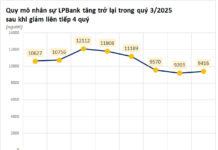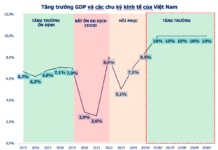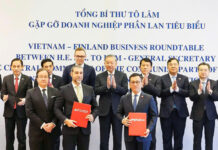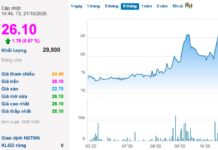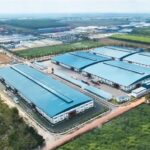While the Vietnamese economy shows promising signs of improvement, with over 24,400 new businesses established in June 2025, per the Ministry of Finance, there are still areas that need attention for a more inclusive recovery.

Foreign tourists experience services on a cruise invested by a private enterprise. Photo: Le Vy |
The Business Confidence Report for 2025, conducted by the Research Commission for Private Economic Development (IV) with 1,531 enterprises in June 2025, reveals a similar sentiment. While there was a slight dip in optimism compared to the previous year, falling from 16.1% to 15.9%, business confidence remains relatively stable.
Furthermore, the proportion of businesses planning to expand increased from 1.7% to 2.4%, thanks to domestic reforms, notably the “Quadruple Resolution Pillar” on the development of the private sector (68-NQ/TW), science and technology (57- NQ/TW), administrative procedure reform (66-NQ/TW), and international integration (59-NQ/ TW).
Mr. Tu Tien Phat, General Director of ACB, a bank specializing in serving SME and retail customers, quickly sensed the excitement and belief in a new phase of development for the private sector following Resolution 68. “A business leader shared with us that they were hesitant to expand their investments before feeling included in the government’s policies towards the private sector. But now, they are determined to expand,” said Mr. Phat.
According to ACB’s representative, Resolution 68 addresses significant concerns of private enterprises. The resolution outlines tax exemption policies for three years for startups and support for transparent and low-cost capital access. Additionally, reduced inspections and simplified administrative procedures will boost businesses’ morale. The resolution also mentions other critical issues such as market expansion, domestic supply chain development, and promoting green transformation, covering almost all challenges faced by private enterprises.
“The business community highly anticipates the early institutionalization of the contents of Resolution 68 into specific laws and decrees. While the National Assembly and the Government have put forward clear action programs, the business community now awaits the next step: effective and synchronized implementation in reality,” Mr. Phat added.
Mr. Dau Anh Tuan, Vice Secretary-General of the Vietnam Chamber of Commerce and Industry (VCCI), acknowledged that the spirit of Resolution 68 had quickly permeated the draft laws, decrees, and circulars of ministries and sectors. Some localities, like Thua Thien Hue and Hanoi, have implemented a “green channel” to reduce procedure execution time by 60%. However, he noted that the policy’s impact was not evenly distributed, with large enterprises enthusiastic and small businesses and households still apprehensive.
VCCI conducted a rapid survey of 1,368 households regarding procedures, especially taxes. Many were concerned about the financial burden of investing in equipment, software, and management costs, with 66% expecting operating costs to rise, 64% worried about profit decline, 73% lacking technology knowledge and skills, and 90% struggling with changing old habits. Notably, a large proportion feared retroactive taxation, although no such cases have occurred.
Concrete support policies are needed for small businesses
With a target of reaching 2 million enterprises by 2030, including at least 20 large private enterprises participating in the global value chain, as directed in Resolution 68, the current focus is on nurturing small and medium-sized enterprises (SMEs) to grow into larger entities.
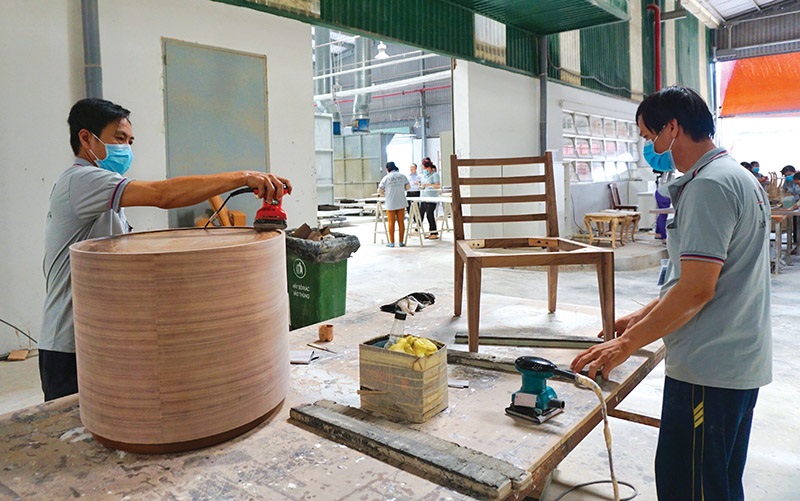
Many Vietnamese enterprises have become self-reliant in technology and raw material production. Photo: Le Vy
|
For instance, Hoa Phat began constructing an integrated steel production complex in Hai Duong in 2007, with VOF (a Vinacapital investment fund) investing $47 million in the form of equity capital, equivalent to 5% of its capitalization at that time.
After 17 years, Hoa Phat’s capacity has reached 8.5 million tons/year, with a 25.6-fold increase in revenue. This leading steel manufacturer in market capitalization now has numerous opportunities to engage in significant projects.
To replicate such success stories, Mr. Tran Viet Anh, Director of Thai Son Import-Export Company, wishes for more dialogues between management agencies and enterprises in different groups and industries. This would enable authorities to understand the challenges faced by businesses. Additionally, he suggests strengthening measures to protect the domestic market, creating effective tools to prevent cheap goods, and studying regulations to ensure fairness in bidding…
“The state needs to concretize support for this group through legal documents or existing enterprise support laws, without necessarily issuing a series of new regulations,” Mr. Viet Anh noted.
Mr. Tran Van Le, Chairman of Phuong Linh Electromechanics Group, pointed out that the business environment is plagued by unfair competition, eroding value creation. Despite building two factories and eight research centers, Phuong Linh is not considered wealthy due to countless intangible costs, from administrative procedures to other barriers. “Where is the profit if there is no mechanism to support reducing costs and increasing competitiveness for domestic enterprises?” Mr. Le wondered.
Additionally, the absence of anti-dumping laws means that values such as labor, raw materials, and management capabilities in Vietnam are not protected. In contrast, Japanese law protects businesses by setting a minimum profit margin to ensure their survival.
Meanwhile, Ms. Mai Kieu Lien, Director of Vietnam Dairy Company (Vinamilk), hopes that ministries, sectors, and the government will promptly address issues arising during policy implementation. For enterprises, seizing opportunities can mean a five- to ten-year head start, while missing them can set them back fifty years.
“In our company, if there’s an issue that reaches the director, it must be resolved within 48 hours. I wish there were a similar timeframe for the government, from when an issue arises to when it reaches the Prime Minister. Whether it’s seven days, fifteen days, or any other duration, there should be a definite timeframe for resolving enterprises’ concerns,” Ms. Lien stated.
Emphasizing the sensitivity of small and medium-sized enterprises and households to policy changes, Mr. Dau Anh Tuan suggested simple, transparent, and stable policies. For small households, detailed and practical support is needed through question-and-answer sessions and hands-on training.
To effectively implement Resolution 68, Mr. Tuan suggested that criteria for private sector development should be considered the most critical factor in evaluating the task completion of authorities at all levels, including new business growth, investment attraction, and private enterprise satisfaction. “Only then can we create a strong impetus for policy implementation at the local level,” he noted.
Hoang Ngoc
– 13:00 01/09/2025
“Experts: Progressive Policies are Only as Good as Their Implementation”
“Vietnam has long been lauded for its progressive reforms, and this is testament to the country’s forward-thinking policies. However, as Oliver Massmann, Managing Director of Duane Morris Vietnam and a veteran legal practitioner in the country for almost three decades, points out, the gap between policy formulation and implementation remains a challenge. The key issue, according to Massmann, is not a lack of new policies, but rather the pace of enforcement. Vietnam’s potential is undeniable, yet to fully unlock it, the country must address the disconnect between its ambitious plans and on-the-ground realities.”
The Next Billion-Dollar Investment Destination: A Western Highland Province’s $5 Billion Opportunity with Vingroup, Trung Nam, THACO AGRI, and Nutifood.
The province is set to grant investment cooperation memorandums to 42 projects, boasting a total registered capital of nearly $3.6 billion. Additionally, the conference witnessed the granting of investment registration certificates and investment policy decision approvals to 27 projects, with a total registered capital of over $1 billion.
Resolution 68: Transforming Perceptions and Mindsets About the Private Sector
“Professor Dang Viet Anh highlights the ambitious goals set by Resolution 68, which envisions a significant boost in private enterprises in Vietnam by 2030. The resolution aims for a substantial increase, targeting at least 1 million additional private businesses in the country by the end of the decade.”
The Master Wordsmith: Crafting Captivating Copy that Elevates Your Web Presence
Unveiling the Art of Asset Recovery: How Mr. Truong Gia Binh Retrieved a Whopping $700 Million
FPT’s stock has plummeted by over 31% since the start of the year. This sharp decline has investors concerned about the future prospects of this once-promising company. With such a significant drop, it’s clear that FPT is facing challenges that are impacting its performance and worrying shareholders. The question now is: what steps will FPT take to address this downward trend and reassure its investors?
Unleashing Private Sector Growth: Unlocking Long-Term Capital from Domestic Sources
Resolution 68-NQ/TW has set forth a number of breakthrough requirements to develop the private economy, with one of its key focuses being to enhance long-term capital provision for businesses.






